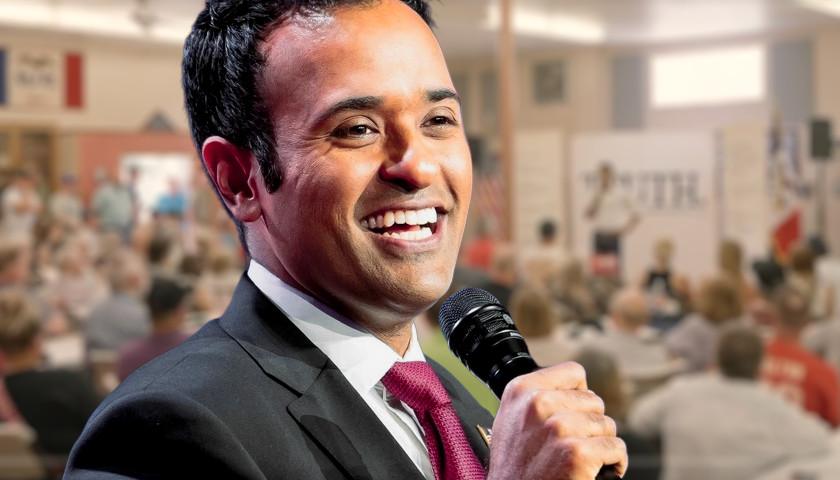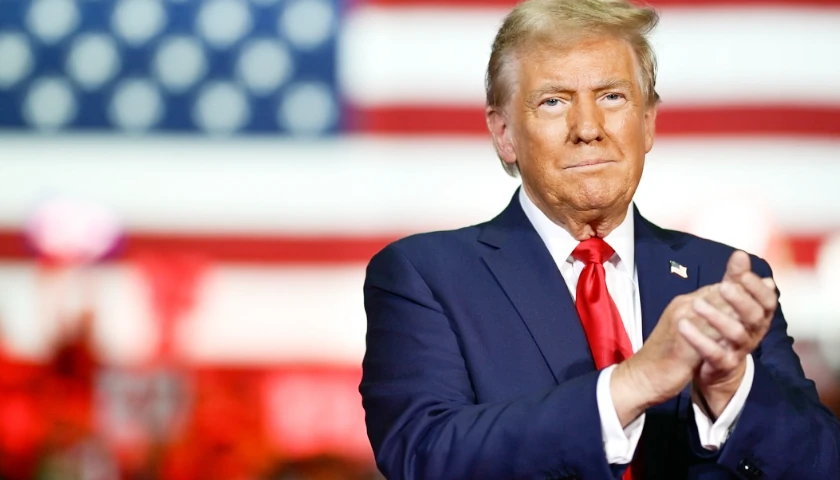As he takes heat for proposing that the United States roll back aid to Israel in pursuit of stronger regional relationships for the key American ally, GOP top tier presidential candidate Vivek Ramaswamy says he wants a new approach to U.S. relations with friends and foes alike.
And he’s harkening back to the founders’ vision of avoiding “entangling alliances” to get there.
“We will be Uncle Sucker no more,” the Ohio biotech entrepreneur wrote in a foreign policy position piece published Monday in The American Conservative. The op-ed, headlined, ‘A Viable Realism and Revival Document,” lays out Ramaswamy’s vision of resetting U.S. foreign policy to further put U.S. interests first.
The Washington Doctrine provides apt inspiration of where to begin. I will lead our nation from the bloody follies of neoconservatism and liberal internationalism abroad towards a strategy that affirmatively defends our homeland. We will be Uncle Sucker no more. Rather than…
— Vivek Ramaswamy (@VivekGRamaswamy) August 28, 2023
In an interview earlier this month on the podcast “Stay Free with Russell Brand,” Ramaswamy said he wants to expand the Abraham Accords, the pillar of former President Donald Trump’s Middle East policy that normalized relations between Israel, the United Arab Emirates and others. Expanded and improved relations with Israel and more of its its neighbors would make it so additional aid for Israel “won’t be necessary” by 2028, the expiration date on the current aid package, Ramaswamy told Brand.
Fellow Republican presidential candidate Nikki Haley quickly blasted Ramaswamy in a press release, asserting, “Support for Israel is both the morally right and strategically smart thing to do.”
“Both countries are stronger and safer because of our ironclad friendship. As president, I will never abandon Israel,” the former United Nations ambassador in the Trump administration said.
“Under your watch, you will make America less safe. You have no foreign policy experience, and it shows,” Haley scolded Ramaswamy at last week’s first GOP presidential primary debate in Milwaukee.
Ramaswamy, like Trump, has hammered home an “America First” vision of foreign policy, pushing back hard against what he and many other conservatives see as a globalist take over of U.S. interests at home and abroad. While Ramaswamy said he would “never leave Israel hanging out to dry,” America’s interests must come first.
“There’s no North Star commitment to any one country other than the United States of America,” he told Brand, a British actor and activist.
Israel, a critical U.S. ally in the Middle East, has long enjoyed bipartisan support. The current memorandum of understanding between the two nations grants Israel $3.8 billion annually in U.S. aid until it expires in 2028.
Ramaswamy has said the U.S. needs to honor its current commitments to Israel while moving to stabilize an ever-unstable region of the world. The political outsider is proposing an “Abraham Accords 2.0” that he says would strengthen U.S.-Israeli relations on the basis of a “friendship,” not a “client relationship.”
“And you know what friends do? Friends help each other stand on their own two feet. So I will lead Abraham Accords 2.0. I will partner with Israel to make sure Iran never is nuclear armed,” Ramaswamy said last week.
The 38-year-old candidate, the first millennial to run for the GOP presidential nomination, says it’s time for a new direction in U.S. relationships built on the wisdom of the founders. He pointed to the the Washington Doctrine of Unstable Alliances, outlined by President Thomas Jefferson in 1801, to avoid “entangling alliances.” The United States has since found itself entangled in all kinds of alliances.
“The Washington Doctrine provides apt inspiration of where to begin. I will lead our nation from the bloody follies of neoconservatism and liberal internationalism abroad towards a strategy that affirmatively defends our homeland,” Ramaswamy wrote on X. “We will be Uncle Sucker no more.”
Like Trump, Ramaswamy has been critical of the $90 billion-plus in U.S. military aid to Ukraine in fighting a war against the invading Russian army. As president, he said he would negotiate a peace deal that would in part block Ukraine from joining NATO and attempt to break up the Kremlin’s increasingly cozy relationship with Communist China.
His position doesn’t sit well with many of his GOP opponents, particularly Haley and former Vice President Mike Pence, who have vehemently defended expanded funding and continued U.S. support for Ukraine as a matter of national security.
But a majority of Americans disagree. A CNN poll released earlier this month found 55 percent of Americans are opposed to more funding for Ukraine — 71 percent of those respondents identifying as Republicans and 55 percent independents. Thirty-eight percent of Democrats say they don’t support additional funding.
Ramaswamy, in a Republican Party primary chase dominated by Donald Trump, has campaigned for the White House pledging to take the former president’s Make America Great Again (MAGA) vision to the next level — without the Trump baggage. It was Trump who campaigned and delivered on a promise to pressure NATO nations to pay more for their defense, with the United States picking up less of the tab.
Ramaswamy in his policy piece noted President Richard Nixon laid out a doctrine calling for U.S. allies to bear their own security burdens, “with America serving as defender of last resort.”
“In the years since Nixon formulated his doctrine, our country has moved from being one of two superpowers to ascendancy as the world’s sole superpower after the fall of the USSR. We squandered our post-Cold War opportunity to preserve that position through a bipartisan embrace of “democratic capitalism” with Communist China, on the false premise that we could spread democracy through capitalism by creating mutual economic codependence with China,” he wrote.
“Rather than spending billions projecting power into global vacuums where our allies will not spend to maintain it themselves, we will put America First again—as George Washington urged—as we recalibrate and consider our true interests,” Ramaswamy wrote.
– – –
M.D. Kittle is the National Political Editor for The Star News Network.
Photos “Vivek Ramaswamy on the Campaign Trail” by Vivek Ramaswamy.





